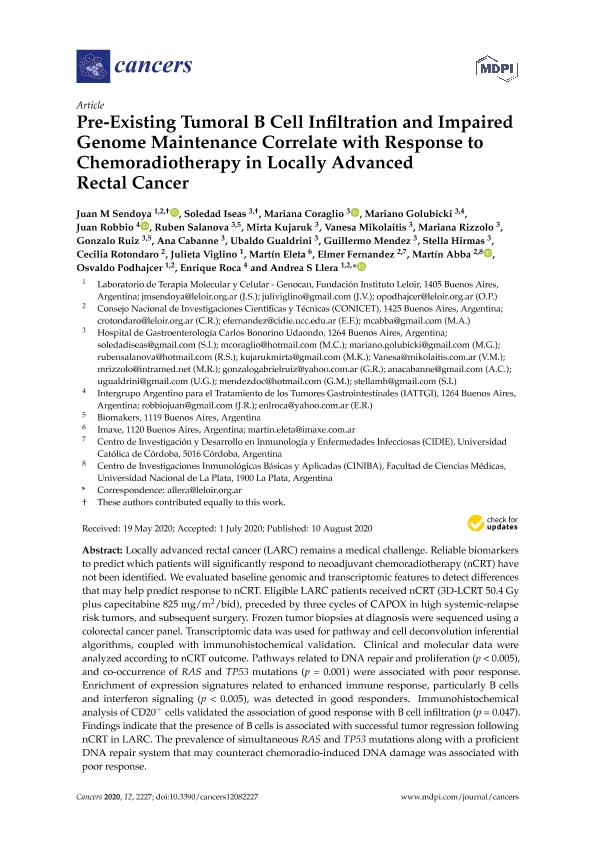Artículo
Pre-existing tumoral B cell infiltration and impaired genome maintenance correlate with response to chemoradiotherapy in locally advanced rectal cancer
Sendoya, Juan Martín ; Iseas, Soledad; Coraglio, Mariana; Golubicki, Mariano; Robbio, Juan; Salanova, Ruben; Kujaruk, Mirta; Mikolaitis, Vanesa; Rizzolo, Mariana; Ruiz, Gonzalo; Cabanne, Ana; Gualdrini, Ubaldo; Mendez, Guillermo; Hirmas, Stella; Rotondaro, Cecilia
; Iseas, Soledad; Coraglio, Mariana; Golubicki, Mariano; Robbio, Juan; Salanova, Ruben; Kujaruk, Mirta; Mikolaitis, Vanesa; Rizzolo, Mariana; Ruiz, Gonzalo; Cabanne, Ana; Gualdrini, Ubaldo; Mendez, Guillermo; Hirmas, Stella; Rotondaro, Cecilia ; Viglino, Julieta; Eleta, Martín; Fernandez, Elmer Andres
; Viglino, Julieta; Eleta, Martín; Fernandez, Elmer Andres ; Abba, Martín Carlos
; Abba, Martín Carlos ; Podhajcer, Osvaldo Luis
; Podhajcer, Osvaldo Luis ; Roca, Enrique Luis; Llera, Andrea Sabina
; Roca, Enrique Luis; Llera, Andrea Sabina
 ; Iseas, Soledad; Coraglio, Mariana; Golubicki, Mariano; Robbio, Juan; Salanova, Ruben; Kujaruk, Mirta; Mikolaitis, Vanesa; Rizzolo, Mariana; Ruiz, Gonzalo; Cabanne, Ana; Gualdrini, Ubaldo; Mendez, Guillermo; Hirmas, Stella; Rotondaro, Cecilia
; Iseas, Soledad; Coraglio, Mariana; Golubicki, Mariano; Robbio, Juan; Salanova, Ruben; Kujaruk, Mirta; Mikolaitis, Vanesa; Rizzolo, Mariana; Ruiz, Gonzalo; Cabanne, Ana; Gualdrini, Ubaldo; Mendez, Guillermo; Hirmas, Stella; Rotondaro, Cecilia ; Viglino, Julieta; Eleta, Martín; Fernandez, Elmer Andres
; Viglino, Julieta; Eleta, Martín; Fernandez, Elmer Andres ; Abba, Martín Carlos
; Abba, Martín Carlos ; Podhajcer, Osvaldo Luis
; Podhajcer, Osvaldo Luis ; Roca, Enrique Luis; Llera, Andrea Sabina
; Roca, Enrique Luis; Llera, Andrea Sabina
Fecha de publicación:
08/2020
Editorial:
MDPI AG
Revista:
Cancers
ISSN:
2072-6694
Idioma:
Inglés
Tipo de recurso:
Artículo publicado
Clasificación temática:
Resumen
Locally advanced rectal cancer (LARC) remains a medical challenge. Reliable biomarkers to predict which patients will significantly respond to neoadjuvant chemoradiotherapy (nCRT) have not been identified. We evaluated baseline genomic and transcriptomic features to detect differences that may help predict response to nCRT. Eligible LARC patients received nCRT (3D-LCRT 50.4 Gy plus capecitabine 825 mg/m2 /bid), preceded by three cycles of CAPOX in high systemic-relapse risk tumors, and subsequent surgery. Frozen tumor biopsies at diagnosis were sequenced using a colorectal cancer panel. Transcriptomic data was used for pathway and cell deconvolution inferential algorithms, coupled with immunohistochemical validation. Clinical and molecular data were analyzed according to nCRT outcome. Pathways related to DNA repair and proliferation (p < 0.005), and co-occurrence of RAS and TP53 mutations (p = 0.001) were associated with poor response. Enrichment of expression signatures related to enhanced immune response, particularly B cells and interferon signaling (p < 0.005), was detected in good responders. Immunohistochemical analysis of CD20+ cells validated the association of good response with B cell infiltration (p = 0.047). Findings indicate that the presence of B cells is associated with successful tumor regression following nCRT in LARC. The prevalence of simultaneous RAS and TP53 mutations along with a proficient DNA repair system that may counteract chemoradio-induced DNA damage was associated with poor response.
Archivos asociados
Licencia
Identificadores
Colecciones
Articulos(CCT - LA PLATA)
Articulos de CTRO.CIENTIFICO TECNOL.CONICET - LA PLATA
Articulos de CTRO.CIENTIFICO TECNOL.CONICET - LA PLATA
Articulos(CIDIE)
Articulos de CENTRO DE INV. Y DESARROLLO EN INMUNOLOGIA Y ENFERMEDADES INFECCIOSAS
Articulos de CENTRO DE INV. Y DESARROLLO EN INMUNOLOGIA Y ENFERMEDADES INFECCIOSAS
Articulos(IIBBA)
Articulos de INST.DE INVEST.BIOQUIMICAS DE BS.AS(I)
Articulos de INST.DE INVEST.BIOQUIMICAS DE BS.AS(I)
Citación
Sendoya, Juan Martín; Iseas, Soledad; Coraglio, Mariana; Golubicki, Mariano; Robbio, Juan; et al.; Pre-existing tumoral B cell infiltration and impaired genome maintenance correlate with response to chemoradiotherapy in locally advanced rectal cancer; MDPI AG; Cancers; 12; 8; 8-2020; 1-22
Compartir
Altmétricas



